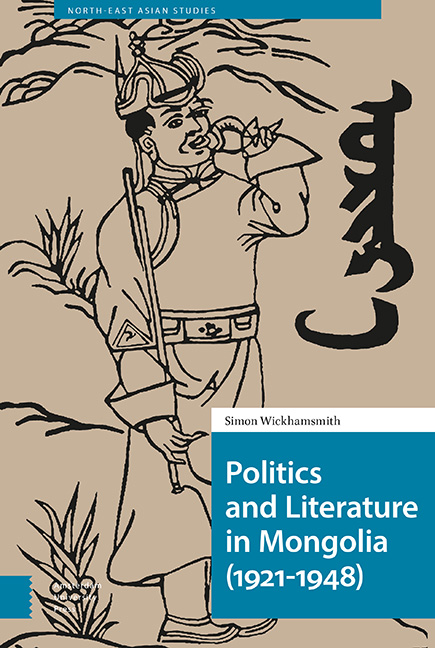Book contents
- Frontmatter
- Dedication
- Contents
- Transliteration and Mongolian Names
- Introduction
- 1 Prefiguring 1921
- 2 Staging a Revolution
- 3 Landscape Re-Envisioned
- 4 Leftward Together
- 5 Society in Flux
- 6 Negotiating Faith
- 7 Life and its Value
- 8 The Great Opportunistic Repression
- 9 A Closer Union
- Appendix: Brief Biographies of Writers
- Index
8 - The Great Opportunistic Repression
Published online by Cambridge University Press: 21 November 2020
- Frontmatter
- Dedication
- Contents
- Transliteration and Mongolian Names
- Introduction
- 1 Prefiguring 1921
- 2 Staging a Revolution
- 3 Landscape Re-Envisioned
- 4 Leftward Together
- 5 Society in Flux
- 6 Negotiating Faith
- 7 Life and its Value
- 8 The Great Opportunistic Repression
- 9 A Closer Union
- Appendix: Brief Biographies of Writers
- Index
Summary
Abstract
The chapter gives an account of the trials in October 1937 of the leading writers S. Buyannameh and M. Yadamsüren and shows the effect of the Soviet-style purges on literature at the time. Accusations of spying for the Japanese and of other counterrevolutionary activity meant that very few intellectuals and creative artists were untouched by the trials. Those who were – including writers such as D. Sengee, who was openly supportive of the Party's trajectory – benefited by replacing those who were executed as well as those who had been removed from their positions. Among some younger writers, an interest in Socialist Realism resulted in an increase in texts about industrialization, the Young Pioneers, the ‘friendship’ between Mongolia and the Soviet Union, and the growing cult of personality surrounding Choibalsan.
Keywords: Great Repression, Stalinist purge, Stalin, Young Pioneers, modernization policies
Everyone has a light side and a dark side. When a person dies, the nation's population, those who are left behind, indeed everything fine which had formed this person, remains. This is why our Mongolian people protect those pure ways which will not disturb those who have died.
Even before the MPRP initiated the Great Repression (Ih Helmegdel) on 10 September 1937, the political wind was turning against those writers whose political consciousness had been formed by the revolution and towards those younger writers who had known nothing but revolutionary Mongolia and whose work reflected the Party's ever closer friendship with the Soviet Union. The replacement in 1936 of Buyannemeh and Yadamsüren at the head of MARL with the likes of D. Tsevegmid, who was made secretary at just 21 years of age, was evidence of the ideological cracks that were appearing in the reputation of more established writers.
The movement of Mongolia towards the Soviet Union reflected the movement Choibalsan was making towards Stalin, and those who appeared to resist or even question Choibalsan's ascendency – and, in time, the cult of personality that grew around him as it already had around Stalin – were gradually stripped of power and, in many cases, eliminated. As in the Soviet Union, intellectuals and creative artists were primary targets.
- Type
- Chapter
- Information
- Politics and Literature in Mongolia (1921–1948) , pp. 267 - 290Publisher: Amsterdam University PressPrint publication year: 2020



